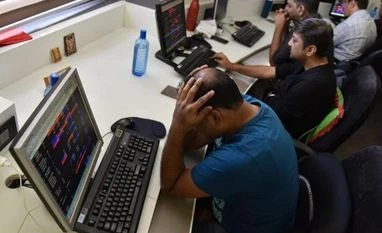The domestic stock market fell sharply on Monday amid a broad-based sell-off after the government said the
Chinese troops 'carried out provocative military movements in Eastern Ladakh to change the status quo' but they were blocked by Indian soldiers. The incidents took place in between August 29-30 night.
Further, nervousness around Q1 GDP numbers, which is slated to be released later in the day, and Sebi's new margin norms, too, dragged the market lower.
READ MORE The S&P BSE Sensex declined 839 points or 2.13 per cent to settle at 38,628 levels. Of 30 constituents, 28 declined and just 2 advanced. Reliance Industries (RIL) was the biggest contributor to the index's loss, followed by ICICI Bank, and HDFC.
NSE's Nifty settled at 11,387.50, down 260 points or 2.23 per cent. India VIX jumped over 24 per cent to 22.84 levels.
All the sectoral indices on the NSE ended in the red. Nifty Bank slumped over 750 points, or 3 per cent to 23,754.35 levels, with all the 12 constituents declining. Nifty PSU Bank index slipped nearly 5 per cent to 1,525 levels.
The broader market fared worse than the headline indices. The S&P BSE SmallCap index plunged over 4 per cent to 14,336 levels while the S&P BSE MidCap index settled at 14,661, up 3.8 per cent.
Global markets
World stocks hovered near record highs on Monday and were set to end August with five consecutive months of gains, as investors bet on central banks keeping up the policy punchbowl for years to come.
An upbeat reading on China’s service sector added to the positive mood, with MSCI’s broadest index of Asia-Pacific shares outside Japan touching its highest since March 2018.
London was closed for a public holiday, while U.S. stock futures pointed to a positive open for Wall Street ESc1 1YMc1.
In commodities, oil rose with Brent touching the highest in five months, underpinned by a 30 per cent cut in Abu Dhabi crude supplies and encouraging Chinese data even as global demand struggles to return to pre-COVID levels in a well-supplied market.
(With inputs from Reuters)
)